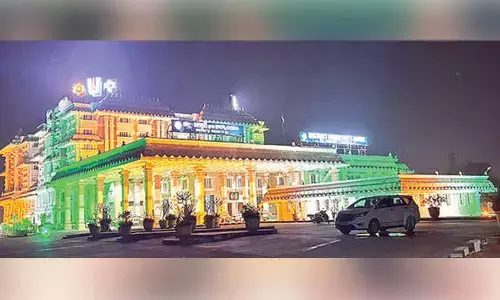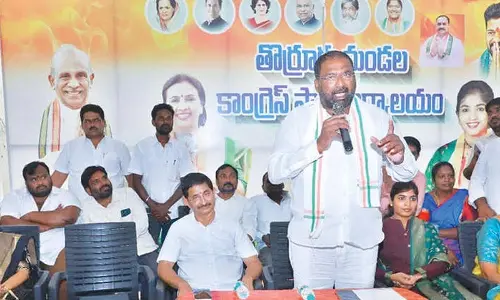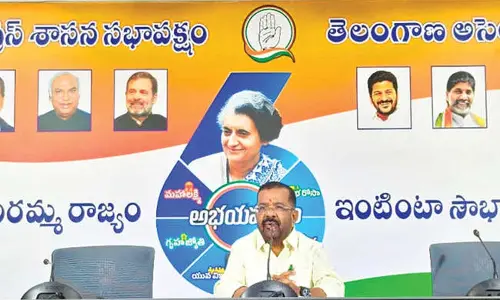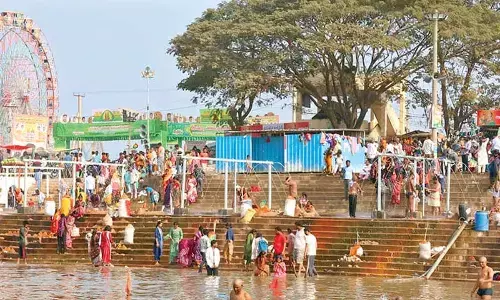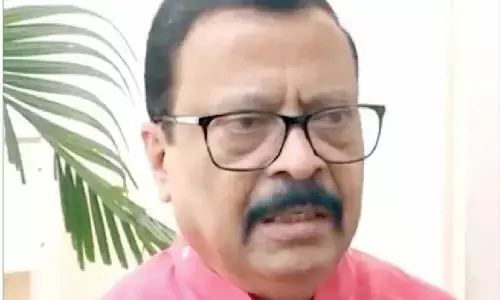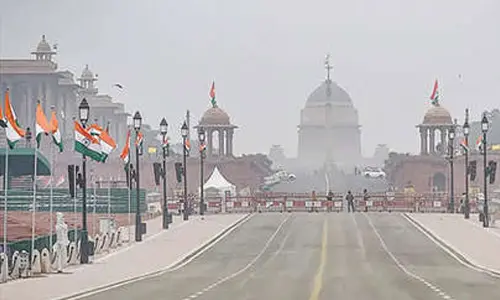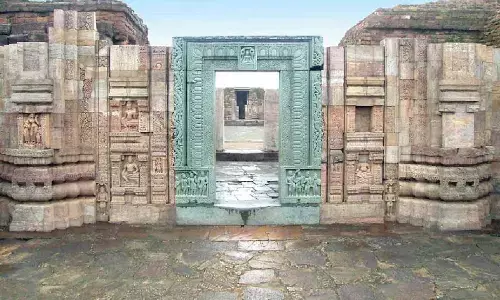Lessons to draw from UK, Sunak
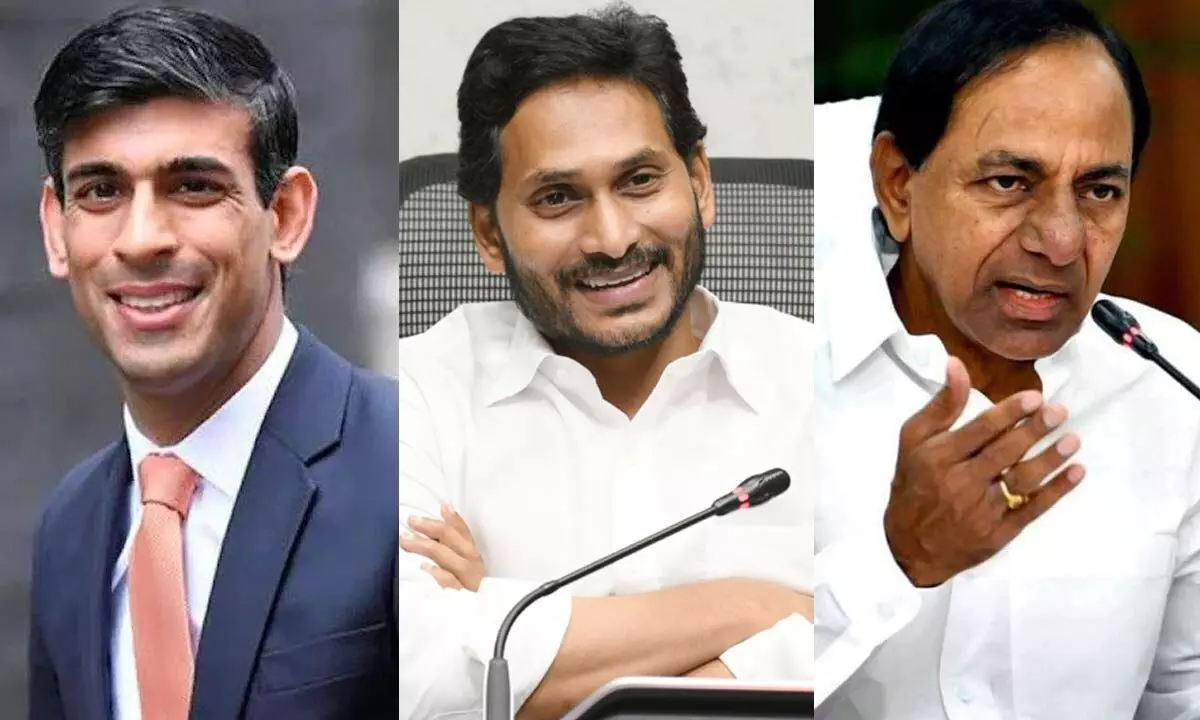
Rishi Sunak, YS Jagan Mohan Reddy and KCR
As long as we judge people by their bank account instead of their character and their actions, political pollution in India will not end
As long as we judge people by their bank account instead of their character and their actions, political pollution in India will not end. Rishi Sunak has certainly set an example of how a politician should behave and be humble. Rishi and his wife Akshata Murty have an estimated net worth of over £730 million and is known to have multiple lavish properties across the world, including one in California.
Still, Rishi has opted to live in a two bedroom flat above No 10 Downing Street. One may say what's so great. He was living there earlier when he was the Chancellor (Finance Minister) to former PM Boris Johnson and got it refurbished in April. Yes, he was there till recently, but one should understand that unlike his Indian counterparts, he got the house refurbished at his own expense.
Here in India, a Chief Minister or a minister or for that matter a senior officer would be too liberal in getting their office and official residence redecorated with public money in a lavish manner. Rishi could have chosen No 11 Downing Street where many Prime Ministers stayed. The first PM to choose the No 11 flat was Tony Blair and his wife Cherie who swapped the home with the then unmarried Gordon Brown.
No 11 Downing Street is a four-bedroom house and has larger space where his Labrador too could have found enough space. But Sunak opted for smaller one. "It is lovely and we feel very happy here," was his reaction.
The No 10 Downing Street flat now serves as the official residence of the Prime Minister, the PM's office, and a space for the PM to entertain guests, world leaders and royalty. This is in sharp contrast to the huge palace-like houses our leaders live in and have a large number of staff to assist and huge convoy of vehicles and maximum security.
Anyone who is in public life as per the Constitution is the custodian of people's wealth. But unfortunately, our leaders forget that aspect and try to utilise it in non-prudent manner under the guise of welfare schemes. Focussed welfare schemes are must, but if the schemes are tailored to remain glued to power, it is not called prudent financial management. I am sure many people will react in a different manner. But one thing is certain whether anyone agrees or not. If one is not cautious in financial management and goes on implementing direct cash benefit schemes for political gains, we, too, like Britain may land into serious economic crisis.
Spendthrift governments with higher borrowing costs will spell doom in the long run. We have seen how some state governments including the two Telugu states are going in for high borrowings. In fact, more than Telangana, it is Andhra Pradesh government which is surviving on borrowings without creating wealth generation which would commensurate with level of borrowings. Such policies will turn any state or country into a BIMARU state.
Take the example of Britain which always used to say that it is a superpower where "Sun never sets." But now the sun has started setting and the country is on the verge of economic collapse. How it will survive is looming before everyone. The main reason is high debt on account of $ 150 billion subsidy of energy costs for households and businesses. Let's draw a parallel. Here, too, in the name of helping farmers, the state governments announce free power but due to resource crunch they fail to reimburse the cost to the DISCOMs pushing them into red.
The tell-tale signs in British economy were visible right in August 2022 and things became clear with the Mini Budget of Sept 2022 that the road ahead is not smooth. International Monetary Fund (IMF) has predicted such catastrophe for the country long ago.
Let us understand there were many reasons for the economic collapse of the mighty Britain. It's a toxic mix of politics, inflation and higher interest rates threatening the financial system in UK, sending a shock wave through global markets and providing a warning to governments everywhere of the dangers of the new economic era we are entering.
Recently, little over a week ago, the British government resorted to surprise tax cut which sparked the concerns of investors about the fiscal health of the country and questions on its credibility were raised and the pound crashed. There was giant swing in the pound, the longest-dated gilts, which mature in 50 years, lost a third of their value in four days. They then leapt in value by more than a quarter in a day after emergency bond-buying by the Bank of England designed to prevent a cycle of forced selling by pension funds.
A gilt is a UK government liability in sterling, issued by HM Treasury and listed on the London Stock Exchange. It is akin to our bonds. We have seen how the Andhra Pradesh government has been mobilising funds by mortgaging bonds to implement the promises it had made before elections. Mobilising funds through borrowing without creating an eco-system where there can be revenue generation is bound to spell financial doom.
The big moves like high debts and subsidies had a direct impact on world markets, pushing up the dollar and Treasury yields and hitting stocks and commodity prices in UK and the bear market took another leg down and we are seeing the panic situation in the land people used to claim that sun never sets. The superpower which had ruled many countries is now in doldrums.
The financial situation of some of the Indian states is certainly alarming but still the political leaders here are more concerned about 'Khursi Bachao' and for that they do not mind putting anything at stake. The general public too has become habituated to the freebies and cash doles given by the governments.
We do not have a system where the common man can be made aware of the actual financial situation. For many, financial health of a state or country means presentation of budget and the hike in taxes and how it would impact his monthly budget. Even the UKs economic crisis does not bother us because it is not in our country or state. But they do not realise that alarm bells are ringing for us also.
Our leaders who claim that they are the best visionaries and are the most competent people to rule the nation are yet to get out of colonial mindset. Still they work in the direction of decimating opposition, and resort to cheap politricks. The focus most of the time is how to poach legislators from other parties and merge them with their party and avoid disqualification from the legislatures or Parliament.
The latest high drama that Telangana has been witnessing for past four days is a classic example of how the political parties are clashing even for a bypoll. The reason is lack of confidence among the lawmakers of the ruling party. They speak high of the benefits they had been able to deliver to the people. Fine, then why not allow the people to judge their performance? Why does the entire government machinery jump into action even to win a bypoll? If the ruling party wins it would be a bonus and if it loses, the government won't fall.
There is an urgent need for stringent laws regarding changing of political loyalties. It should be mandatory that any public representative who migrates to another party should resign from the legislature or Parliament. In fact, it should be automatic. The presiding officer should immediately announce that the member who has joined another party stands disqualified. Only then the horse trading will stop. I know this is a very tall order in the murky political atmosphere which the country is passing through. We are known for searching for loopholes even before passing the law.
Another new trend that is being witnessed in the two Telugu states is that only the ruling party can hold rallies and meetings while opposition is denied permission by police. This was not the situation in the past. We used to see several agitations by political parties, trade unions and others.
Another change in the political system in the last few years is mixing politics with governance. Every party has a right to differ with whom they consider as a rival party including the party that is ruling at Centre. But when it comes to governance, basic protocols should be followed. If the Prime Minister is holding a virtual meeting on matters of national interest, the Chief Ministers should participate and express their views forcefully.
But most of the time some of the Chief Ministers skip such meetings because they are allergic to the person who is at the helm of affairs. In a federal setup, the states should make their voice heard. Chief Secretaries or officials of that rank cannot take a stand supporting or opposing what the Centre says or give any suggestion.
While fighting political battles, the leaders who claim to be visionaries should find a solution to these problems if the country must become the third largest economy in the country and avoid UK-type financial crisis.









